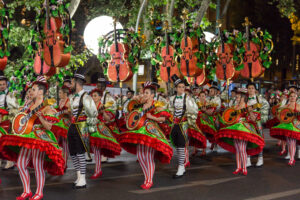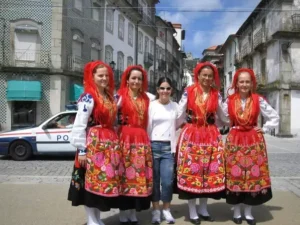Portuguese is a Romance language that comes from Latin. It has a long history of literature that reflects Portugal’s many cultural influences and historical journey. From its early beginnings to modern literary greats, the Portuguese language and literature give us a fascinating look into the country’s identity and its influence on the world. Here is a summary of the history of the Portuguese language and how it has been used in writing.
1. How History Has Changed
People who lived on the Iberian Peninsula during the Roman Empire spoke Vulgar Latin, which is where Portuguese comes from. Latin slowly changed into different Romance languages. In the 12th century, the Galician-Portuguese language appeared. By the 1600s, Portuguese was its own language. The Moors, who brought Arabic words with them, and contact with other European languages during the Age of Exploration had made it so.
2. A worldwide spread
In the Age of Exploration, Portuguese explorers and traders set up colonies in Africa, Asia, and the Americas. This made the language known all over the world. These days, Brazil, Mozambique, Angola, Guinea-Bissau, East Timor, and Equatorial Guinea all speak Portuguese as their official language. Because of its use around the world, the language has become richer by incorporating different regional dialects and styles.
3. Features of the language
People know Portuguese for its beautiful melodies and rhythms. It has a lot of different vowel sounds and a complicated system for changing the form of verbs. There are two main spelling, vocabulary, and pronunciation rules for the language: European Portuguese and Brazilian Portuguese. Even though they are different in these ways, both versions can be understood by anyone and come from the same language family.
Writing in Portuguese
1. Work from the Middle Ages
Portuguese literature has its roots in the Middle Ages. The “Cancioneiro Geral,” a collection of poems from the 15th century, is the earliest known piece of writing. During this time, troubadour poetry was popular, which shows how both Provence and Galicia affected the writing style. King João I is one of the most well-known people from this time. His court was a hub for art and literature.
2. The Baroque and Renaissance eras
Luís de Camões was one of the most important figures in the rise of epic poetry during the Renaissance. His epic poem, “Os Lusíadas” (The Lusiads), which came out in 1556, honors the achievements of Portuguese explorers and is thought to be one of the best pieces of Portuguese literature ever written. It was during the Baroque period that religious themes became more important, and writing became more complex. For example, Padre António Vieira’s works and sermons show this.
3. Romanticism and the 1800s
There was a lot of literary growth in Portugal in the 1800s, thanks to the Romantic movement. Nationalism, individualism, and social change were all topics that writers like Almeida Garrett and José de Almada Negreiros wrote about. Garrett’s “Frei Luís de Sousa” and Almada Negreiros’ “O Livro de Nuno” are two important works from this time that show how Portugal’s culture and politics changed.
4. Modernism and literary works from today
Modernist literature became popular in the early 1900s, and Fernando Pessoa became one of the most important writers in this field. Pessoa changed Portuguese literature with his creative use of heteronyms, which are different literary characters with their own voices and styles. People love his works, like “The Book of Disquiet,” because they make you think and try new things.
Young Portuguese writers like José Saramago, whose novel “Blindness” won the Nobel Prize in Literature in 1998, are always adding new ideas to the genre. Saramago’s books are known for having deep philosophical themes and using unusual ways to tell stories. António Lobo Antunes and Lídia Jorge are two other well-known modern authors who write about identity, history, and social issues.
5. Literature in the World of Portuguese Speakers
Writers from Brazil, Angola, Mozambique, and other Lusophone countries have made important contributions to Portuguese literature that isn’t just from Portugal. With writers like Machado de Assis and Jorge Amado, Brazilian literature has become known all over the world. Angola and Mozambique’s post-colonial literature shows how complicated their histories and societies are. Writers like Pepetela and Mia Couto give important points of view.
Conclusion
There are many historical, cultural, and literary traditions that can be found in Portuguese language and literature. From its roots in poetry from the Middle Ages to its popularity around the world today, Portuguese literature shows how different experiences and influences have shaped Portugal and its former colonies. By studying Portuguese language and literature, you can learn more about the country’s cultural history and the literary contributions it has made to the world. People all over the world are still fascinated and moved by Portuguese literature, whether it’s the epic verses of Luís de Camões or the modernist ideas of Fernando Pessoa.




